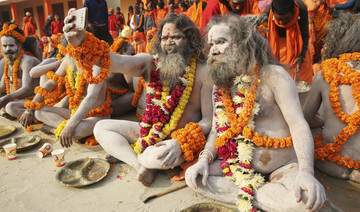LONDON: Sofie Clausager Dar, 34, is looking forward to starting a new job during Ramadan in Denmark, where many Muslims will fast for more than 17 hours a day due to the late sunset.
The Danish convert to Islam will be juggling her full-time job, motherhood, and observing the traditions of the holy month — a particularly onerous task in Scandinavia at this time of year.
“You don’t really have much time for everything that you need to do,” said Dar.
“You need to eat maybe two meals, you need to pray (the sunset and evening prayers), and you need to pray Taraweeh (the optional night-time observation during Ramadan). The time goes so fast.”
Muslims observing Ramadan in Denmark and other countries such as Norway and Iceland will fast for far longer than those further south, where daylight hours are shorter. There are some places where the sun does not set at all at certain times of year — such as Svalbard, a Norwegian archipelago in the Arctic Ocean that is bathed in 24-hour light from April to August, or the city of Tromsø on the mainland to the south.
Muslims who choose to fast in places that see the “midnight sun” have three options, according to Asim Mohammed, 31, a scholar and imam at a mosque in Oslo, Norway.
They can either fast according to dawn and sunset in the nearest city that does not have continuous daylight, the times in Makkah, or according to the times in their own area when the sun last actually set, said Mohammed.

Sofie Clausager Dar and her family. (Supplied)
Mohammed said that some members of his congregation will take holidays during Ramadan in order to cope with the long fast.
“It also depends on what type of work you do — if you’re an office worker, you don’t have a problem because you’re sitting inside with the air conditioning on, but if you work outside in the hot weather during May, June and July, it can be a bit difficult. Most of my congregation — both young and old — fast, and it’s fascinating how they cope,” he said.
Dehydration, fatigue and withdrawal symptoms are some of the consequences of fasting that Muslims may experience.
Dar said that “the lack of liquids, and feeling a bit dehydrated” are what she struggles with most.
“Sometimes you’re way too tired in the evening, you’ve had a long day, you haven’t slept much for a long time and then you end up falling asleep after eating. The next day can be really hard because you haven’t had enough to drink, you may have had only a few glasses of water,” she said.
“The lack of sleep can be really hard. My daughter is at school now and she has to be there at 8 a.m. every morning, so making sure that happens is very tough.”
However, fasting does become easier as the month progresses, Dar added.
“In the beginning it’s harder, but then your body gets used to it and it’s not so much of a struggle,” she said.
Dar highlighted the importance of eating suhoor, the meal eaten before dawn to provide energy for the day ahead. “Otherwise you’re only going to have one meal and one chance to have any liquids to make sure that you don’t become dehydrated,” she said. “Waking up before dawn is something that I always do. Sometimes I don’t sleep (and) take a nap during the day.”
When asked whether she has any strategies in place for her busy Ramadan schedule this year, Dar said: “You just get by. There is no point in worrying about it and thinking it’s going to be so hard.”
Of course, while Muslims in northern Europe face a long fast during late spring and summer, the opposite is the case during the winter months.
“In Norway, there is a huge difference between daylight hours in summer and winter. During winter months like December, sunset can be as early as 3:15 p.m. Of course, everyone prefers Ramadan in winter,” said Imam Mohammed.

During Eid Al-Fitr, the festival that marks the end of Ramadan, creating a fun atmosphere for children can be a challenge in countries where Muslims only form a minority of the population.
Dar said that, while she tries to make Eid as fun as fun as possible for her children, it would be nice if they could experience more Ramadan and Eid traditions in Denmark.
“They could do with more traditions and activities, that would be positive for them,” she said. “We live in a country where Christmas is a big deal, but it would be nice if they could have the equivalent of that as Muslims.”
There are signs, however, that Muslim groups in northern Europe are increasingly clubbing together to celebrate the end of Ramadan.
“During the past two years, some of the Muslim organizations and mosques have started doing Eid together. They’ll hire a hall where they will perform the Eid prayer. After that, people can buy food and there are activities for kids and elders,” said Imam Mohammed.


























